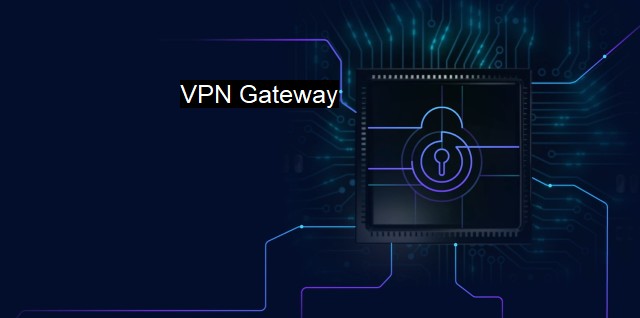What is VPN Gateway?
Understanding the Role of VPN Gateways in Critical Cybersecurity Solutions: A Comprehensive Guide Including Features, Antivirus Benefits and Cyber Threat Prevention.
A Virtual Private Network (VPN) Gateway is a type of network device that creates a secure bridge/connection between networks in different physical places over the public internet. This is especially useful for businesses working remotely in different locations who need to safeguard their activity and information over the internet.Consider a VPN gateway as your internet traffic cop. When your data leaves a private network, have it be your personal or business network, the VPN gateway makes sure the outgoing traffic goes to the correct place while ensuring no unauthorized entities are peeking into your network or tampering with your data. Another crucial part of its role is to ensure authorized traffic coming in knows precisely where to go within the network and is not being used to carry hazardous or malicious materials.
Speaking of malicious materials, VPN Gateways play an integral part in cybersecurity. The transfer of information over the public internet makes data vulnerable to potential cyber threats, VPN Gateways provide a line of defense against these threats. Firstly, VPN technology employs complex authentication and encryption techniques to add layers of security. It masks the actual IP address of the network, making it difficult for anyone to trace the original source. Also, it encrypts the data transmitted over the network, making it unreadable for anyone who tries to intercept it.
VPN Gateways effectively help contain the spread of viruses and malware. This is how it takes on antivirus responsibilities: the moment a data packet enters the VPN, it serves as a checkpoint to examine whether it houses any malicious entities. If there's antivirus software integrated with the VPN gateway, it can scan, detect, and remove any potential malware before it infiltrates the network.
Digging more deeply into how VPN Gateways function, they operate on two types of VPNs Tunneling Protocols - Site-to-Site VPN and Remote Access VPN. Site-to-Site VPN connects entire networks to each other. For instance, they can connect a business's main office network to its branch office networks. This form of VPN is implicitly trusted, and generally doesn’t undergo strict security authentication each time data passes through.
Remote Access VPN is a user-to-network connection, which is used for employees remote access to their company’s private network. Remote Access protocols are designed to ensure that each new session is uniquely authenticated and encrypted, giving a lot more case-by-case scrutiny due to the variety and unpredictability of public networks that remote users might connect from.
The surge in remote work trends due to the pandemic highlighted the importance of VPN Gateways. It provided an avenue for businesses to continue operations securely despite the threats lurking in the cyberspace. By adding a level of brute-force protection in place, it mitigates the risk of data breaches, securing businesses and building trust among clients and customers.
VPN Gateway isn't exclusively for business use; individuals can also use it for their personal needs such as accessing international content restrictions, protection on unsecured public Wifi, or merely wanting the peace of mind that comes with added online privacy.
To sum up, VPN Gateways are essential for persistent secured connections while managing data traveling in and out of networks. They secure networks from unauthorized access, keep data encrypted and safeguard digital assets from malware. The use of a VPN Gateway can be seen as more than just another layer of security; it acts as a strong wall around digital assets ensuring they are shielded from various cyber threats. Needless to say, amidst the era rife with data breaches and cybercrimes, VPN Gateways are no longer a luxury but a necessity.

VPN Gateway FAQs
What is a VPN gateway?
A VPN gateway is a hardware device or software application that creates a secure and encrypted connection to a VPN server. It acts as an intermediary between the user's device and the internet, allowing users to access the internet through a private and secure connection.What are the benefits of using a VPN gateway?
There are several benefits to using a VPN gateway, including enhanced security and privacy, access to restricted websites and content, and protection against cyber attacks and viruses. A VPN gateway helps protect your data and online activity from prying eyes, hackers, and other malicious actors.What should I look for in a VPN gateway provider?
When choosing a VPN gateway provider, it's important to consider factors such as security, reliability, speed, and ease of use. Look for providers that offer strong encryption and data protection, as well as a large number of servers in different locations to ensure fast and reliable connections.How can a VPN gateway help protect against cyber attacks and viruses?
A VPN gateway encrypts your internet traffic and masks your IP address, making it more difficult for hackers and other malicious actors to intercept your data or launch cyber attacks. It can also help protect against viruses and malware by filtering out malicious traffic and preventing it from reaching your device. By using a VPN gateway, you can add an extra layer of security and protection to your online activities.| | A | | | B | | | C | | | D | | | E | | | F | | | G | | | H | | | I | | | J | | | K | | | L | | | M | |
| | N | | | O | | | P | | | Q | | | R | | | S | | | T | | | U | | | V | | | W | | | X | | | Y | | | Z | |
| | 1 | | | 2 | | | 3 | | | 4 | | | 7 | | | 8 | | |||||||